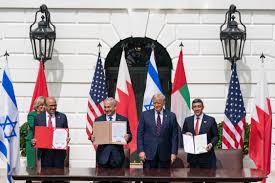Understanding the Abraham Accords and Their Impact

Introduction to the Abraham Accords
The Abraham Accords, signed in September 2020, marked a monumental shift in diplomatic relations within the Middle East. It formalised agreements between Israel and several Arab nations, primarily the United Arab Emirates and Bahrain. This initiative not only aimed to foster peace in a historically tumultuous region but also sought to promote economic cooperation, innovation, and cultural exchanges.
Details of the Agreements
The accords were brokered by the United States under the administration of then-President Donald Trump, who heralded the agreements as a breakthrough in Middle Eastern diplomacy. In July 2021, Morocco and Sudan also indicated their intention to normalise relations with Israel, further expanding the reach of the accords. The agreements established a framework for the signing nations to develop diplomatic relations, enhance trade, and collaborate on issues such as technology and security.
Reactions and Criticism
While the accords were celebrated in some quarters as a step towards long-awaited peace, they were met with apprehension and criticism from various factions. Palestinian leaders expressed disappointment, arguing that the agreements sidestep the legitimate aspirations of the Palestinian people. They viewed the accords as a betrayal by Arab nations that had traditionally supported their cause. Furthermore, critics highlighted concerns regarding the ongoing disputes in the region and the need for a comprehensive resolution to the Israeli-Palestinian conflict.
Future Implications
As of now, the Abraham Accords continue to shape the geopolitical landscape in the Middle East. The potential for more Arab nations to normalise relations with Israel remains viable, with speculations around countries like Saudi Arabia considering similar steps. The progressive strengthening of these ties may not only transform regional diplomacy but also promote stability and economic collaboration across borders.
Conclusion
The significance of the Abraham Accords cannot be understated. Amid ongoing tensions, these agreements offer a pathway towards cooperation and understanding. As nations navigate the complexities of diplomacy, the lasting impact of the Abraham Accords could redefine traditional alliances and foster a new era of peace in the Middle East. As stakeholders continue to monitor the situation, the next few years will be critical in determining the effectiveness of these diplomatic efforts and their influence on the broader peace process.
